In the quest for natural and effective remedies against fungal infections, CBD has emerged as a compound of interest within the wellness community. Known for its wide array of potential health benefits, CBD's antifungal properties present a natural alternative for individuals looking to combat fungal issues without relying solely on traditional medications.
Understanding Fungal Infections: An Overview
Fungal infections represent a broad category of conditions caused by various fungi, microscopic organisms that thrive in warm, moist environments. These opportunistic pathogens can invade and compromise the skin, nails, and other bodily areas, exploiting weakened immune systems or breaches in the skin's integrity. From the commonly experienced athlete's foot and ringworm to the more invasive yeast infections, fungal conditions are not only sources of significant discomfort but also potential precursors to more severe health issues when not promptly addressed.

The Nature and Impact of Fungal Infections
Fungi are ubiquitous in our environment, and while many do not affect human health, a subset can cause infections when they colonize and grow on or inside the body. These infections are categorized based on the affected body part:
Dermatophytosis (Tinea Infections): This category includes athlete's foot (tinea pedis), jock itch (tinea cruris), and ringworm (tinea corporis). These surface-level infections affect the skin, often in warm, moist areas, leading to itching, redness, and sometimes painful rashes.
Onychomycosis: Affecting the nails, this condition usually manifests as thickening, discoloration, and brittleness of the nail plate. It is more common in toenails and can be challenging to treat, requiring prolonged antifungal therapy.
Candidiasis: Yeast infections, most commonly caused by Candida species, can affect the mouth, throat, skin, and genitals. Symptoms vary by infection site but often include itching, redness, and discharge. Candida overgrowth can be triggered by antibiotic use, hormonal changes, or compromised immunity.
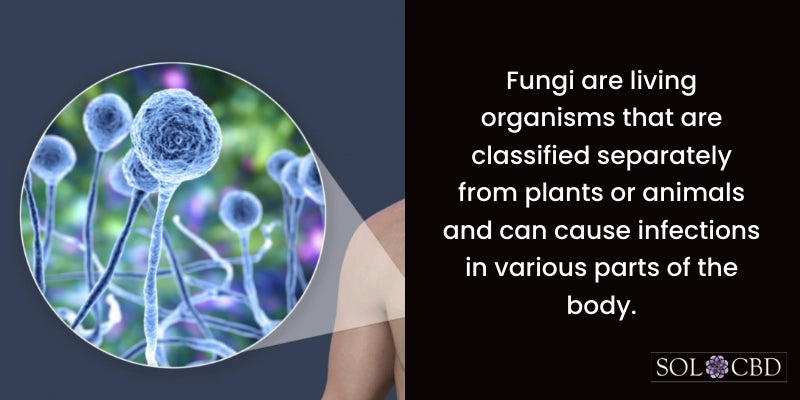
The Importance of Effective Management
The successful management of fungal infections hinges on accurate diagnosis, timely treatment, and preventive measures to avoid recurrence. Treatment modalities may include topical antifungal creams for localized infections or oral antifungal medications for more extensive or resistant infections. Additionally, maintaining good hygiene, keeping affected areas dry, and wearing breathable fabrics can help prevent fungal growth and infection.
Understanding the specific type of fungal infection and its causes is crucial for effective treatment. For instance, athlete's foot requires different care and precautions compared to nail fungal infections or oral thrush. Therefore, consulting healthcare professionals for diagnosis and treatment recommendations is essential for addressing these conditions effectively.
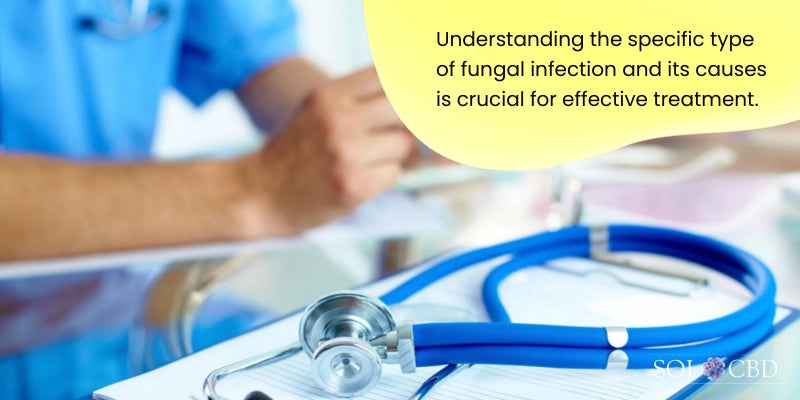
The Science Behind CBD's Antifungal Effects
CBD, a cannabinoid found in the cannabis plant, has been studied for its potential antimicrobial and antifungal properties. Research suggests that CBD can act against various strains of fungi by disrupting their cell membranes, inhibiting growth, and preventing the spread of fungal infections. [1]
This segment delves into the scientific mechanisms underlying CBD's antifungal effects and highlights pivotal research that has advanced our understanding of its potential in combating fungal infections.
The Antifungal Properties of CBD Oil
CBD's antifungal effects are said to be attributed to its interaction with fungal cells and the modulation of the body's response to these infections. Key mechanisms include:
-
Disruption of Fungal Cell Membranes: CBD has been shown to interact with the cell membranes of fungi, causing disruption and leakage of essential cellular components. This membrane interference compromises the integrity of fungal cells, leading to their eventual death. Studies suggest that CBD's ability to penetrate and destabilize fungal membranes is akin to that of conventional antifungal treatments, offering a natural alternative for managing fungal infections. [2]
-
Inhibition of Fungal Growth: Research indicates that CBD can inhibit the growth and proliferation of various fungal strains. By targeting the reproductive mechanisms of fungi, CBD helps prevent the spread of infection, providing a strategic approach to controlling fungal populations and mitigating infection severity. [1]
-
Synergistic Effects with Antifungal Medications: Preliminary studies have explored the potential for CBD to work in synergy with existing antifungal medications, enhancing their efficacy. This synergistic action means lower doses of conventional antifungals may be needed when used in combination with CBD, potentially reducing the side effects associated with higher doses of these medications. [3]
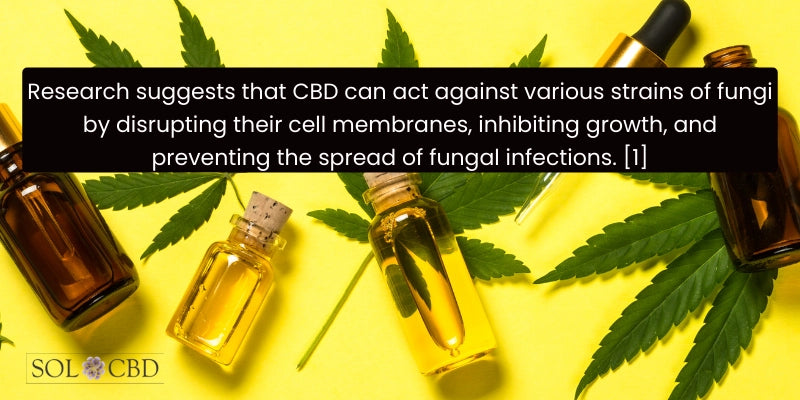
Key Studies Highlighting CBD's Antifungal Potential
Several studies [1-4] have played a critical role in elucidating CBD's antifungal properties:
-
CBD's Efficacy Against Candida Strains: Research focusing on Candida species, a common cause of fungal infections in humans, has demonstrated CBD's effectiveness in inhibiting the growth of these fungi. This research paves the way for CBD's application in treating candidiasis and other related conditions.
-
Comparative Analysis with Standard Antifungals: Studies comparing the antifungal activity of CBD with that of standard antifungal drugs have shown promising results, with CBD exhibiting comparable, and in some cases superior, antifungal properties. These findings support the potential for CBD as an alternative or adjunct treatment in fungal infection management.
-
CBD and Dermatophyte Infections: Investigations into the effectiveness of CBD against dermatophytes, the fungi responsible for conditions like athlete's foot and ringworm, have revealed CBD's potential to alleviate these common skin infections. The research highlights CBD's broad-spectrum antifungal activity and its applicability to a range of fungal pathogens.
The exploration of CBD's antifungal mechanisms and its potential to serve as a natural antifungal agent is an exciting development in the field of alternative medicine. Through its ability to disrupt fungal cell membranes, inhibit fungal growth, and possibly enhance the efficacy of conventional antifungals, CBD emerges as a promising candidate for inclusion in antifungal treatment regimens. As our understanding of CBD's antifungal properties expands through ongoing research, the prospects for its application in managing fungal infections continue to grow, offering hope for effective and natural fungal infection solutions.
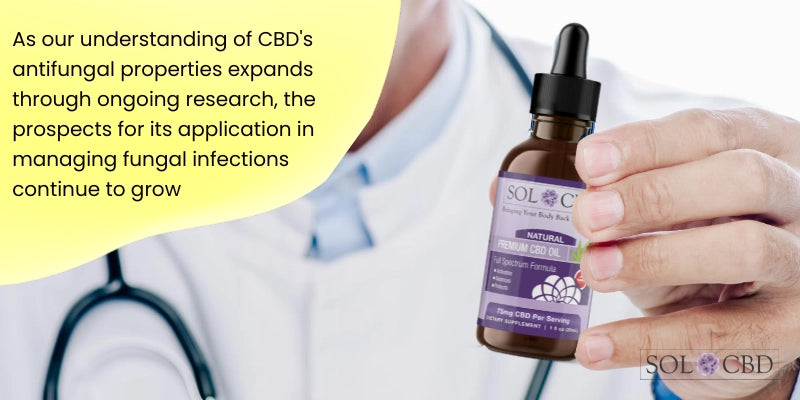
Practical Applications: Harnessing CBD Oil for Fungal Infection Management
CBD's potential antifungal properties, coupled with anti-inflammatory and analgesic effects, make it a compelling addition to traditional care strategies. This section provides detailed guidance on how to effectively incorporate CBD into your fungal infection management regimen, including the selection of forms, determination of dosages, and holistic integration considerations.
Selecting the Right Form of CBD
-
Topical Applications: For localized fungal infections, such as athlete's foot or ringworm, topical CBD products could offer direct relief. Creams infused with CBD can be applied directly to the affected area, potentially reducing inflammation and alleviating symptoms. Look for products specifically formulated for skin use.

-
Systemic Use for Widespread Infections: In cases where the fungal infection is more systemic or internal, such as certain types of candidiasis, oral CBD products like oils, tinctures, or capsules may be more appropriate. These forms allow CBD to be absorbed into the bloodstream, addressing inflammation and immune response from within.

Determining Appropriate Dosages
-
Start Low and Go Slow: The adage "start low and go slow" is particularly relevant when incorporating CBD into your regimen. Begin with the lowest recommended dose to see how your body responds, gradually increasing as needed to achieve desired effects.
-
Consult with a Professional: Given the variability in individual responses to CBD and the lack of standardized dosing guidelines, consulting with a healthcare provider experienced in CBD use is invaluable. They can offer personalized dosage recommendations based on your specific condition and overall health.
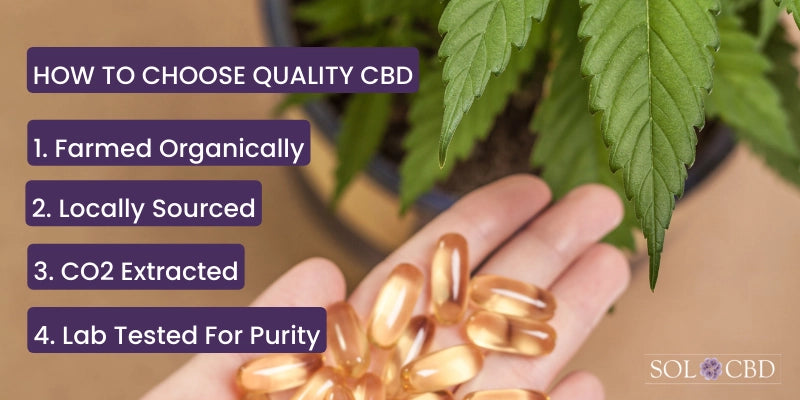
Integrating CBD into a Holistic Management Plan
-
Complementary Approach: CBD should be considered a complement to, not a replacement for, existing antifungal treatments. Continue with prescribed medications and follow your healthcare provider's advice, using CBD as an adjunct for symptom relief and overall wellness.
-
Lifestyle and Dietary Considerations: Integrating CBD into your fungal infection management strategy can be more effective when combined with healthy lifestyle choices. Maintain good hygiene, keep affected areas clean and dry, and consider dietary adjustments that support immune function, such as reducing sugar intake, which can fuel fungal growth.
-
Monitoring and Adjustments: Keep a journal of your CBD usage, symptoms, and any side effects. This documentation can help you and your healthcare provider make informed adjustments over time, optimizing the role of CBD in your antifungal strategy.
Conclusion
Incorporating CBD into the management of fungal infections offers a multifaceted approach to complement traditional treatments. By selecting the appropriate form of CBD, starting with a cautious dosage, and considering holistic lifestyle factors, individuals can harness the potential benefits of CBD for fungal infection relief. Always prioritize professional medical advice and integrate CBD into your care plan with informed, strategic considerations to maximize its efficacy and safety.
Interested in exploring the natural antifungal properties of CBD? Discover SOL CBD's range of products and learn how incorporating CBD into your wellness routine could help manage fungal infections naturally. Remember, consulting with healthcare professionals is crucial when adding new supplements to your health regimen, especially when addressing specific conditions like fungal infections.
Sources
- Anti-Biofilm Activity of Cannabidiol against Candida albicans - PMC (nih.gov)
- Cannabis Use and Fungal Infections in a Commercially Insured Population, United States, 2016 - PMC (nih.gov)
- Potential Combinatory Effect of Cannabidiol and Triclosan Incorporated into Sustained Release Delivery System against Oral Candidiasis - PMC (nih.gov)
- Antifungal and antibacterial activities of Cannabis sativa L. resins. - ScienceDirect




























